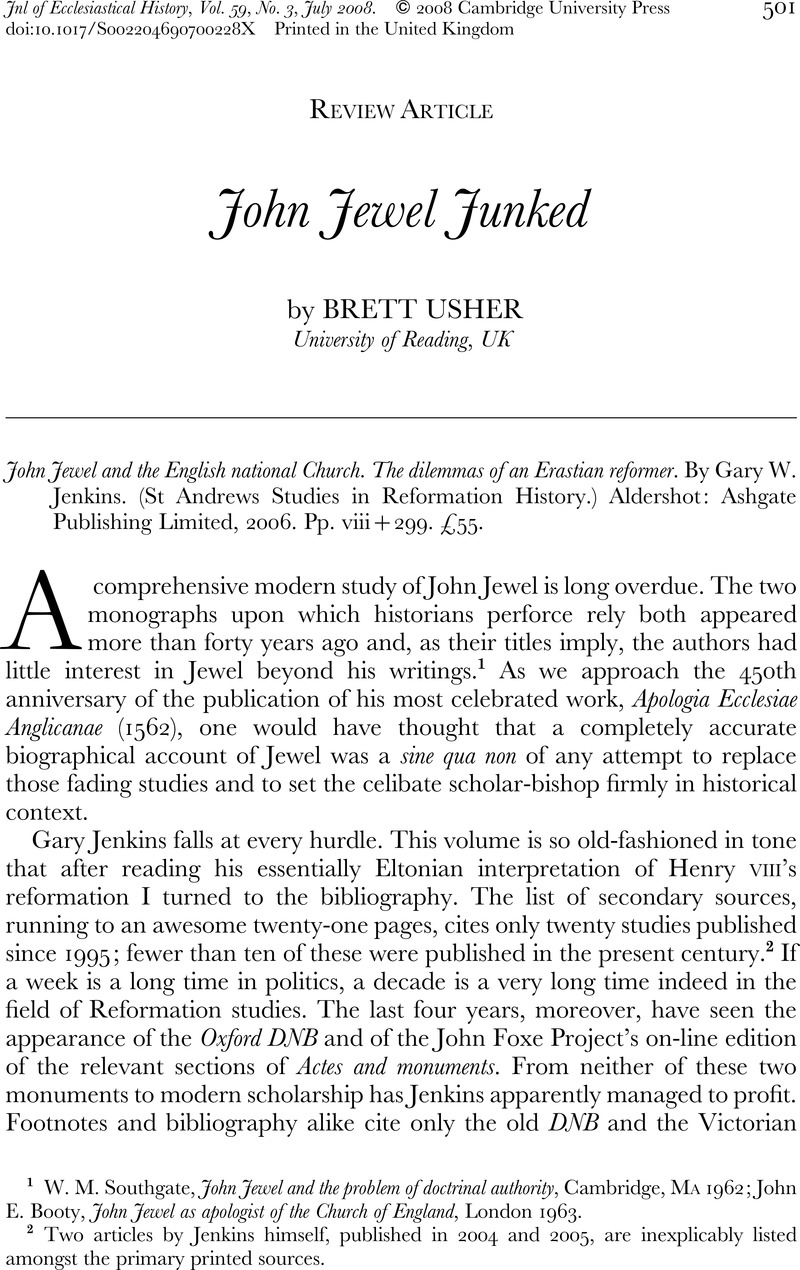Article contents
John Jewel Junked
Review products
Published online by Cambridge University Press: 14 July 2008
Abstract

- Type
- Review Article
- Information
- Copyright
- Copyright © 2008 Cambridge University Press
References
1 W. M. Southgate, John Jewel and the problem of doctrinal authority, Cambridge, Ma 1962; John E. Booty, John Jewel as apologist of the Church of England, London 1963.
2 Two articles by Jenkins himself, published in 2004 and 2005, are inexplicably listed amongst the primary printed sources.
3 There are only five, incidental, references to Foxe himself throughout the entire book.
4 Brief attention is paid to the problem only in the final chapter (pp. 226–7).
5 No work by Bucer is listed amongst the printed primary sources in the bibliography.
6 Laurence Humphrey, Ioannis Iuelli … vita & mors, London 1573, 82–3. For Goldsmith, a member of Queen Katherine Parr's household and an MP in 1559, see P. W. Hasler, The House of Commons, 1558–1603, London 1980, ii. 201–2.
7 For references see C. H. Garrett, The Marian exiles, Cambridge 1938, 198, and Diarmaid MacCulloch, Thomas Cranmer, New Haven–London 1996, 573.
8 Of the first twenty-eight episcopal appointments of the reign, eleven in fact went to men who had not been in exile and a mere handful to former exiles thereafter.
9 See Brett Usher, William Cecil and episcopacy, Aldershot 2003, chs i–iv. As for Jenkins's appreciation of the role of the privy council in ecclesiastical affairs there is a single reference to ‘The London Council’ (p. 36).
10 Only six of the seventy-five men consecrated under Elizabeth were under forty.
11 Felicity Heal, Of prelates and princes, Cambridge 1980, 250.
12 See the quotation from it by John Craig in his entry on Jewel in the Oxford DNB.
13 Humphrey, Vita, 99.
14 See, for example, Richard Hilles to Heinrich Bullinger, 8 Mar. 1571, in The Zurich letters, ed. Hastings Robinson (Parker Society, 1842–5), ii. 180–1.
15 It should also be noted that Henry Smith was a kinsman of the Cecils and may therefore have received Burghley's loyal support in any event.
16 There is confusion here with the Edwardian government's experimentation, not revived under Elizabeth, with retaining diocesan estates in exchange for a fixed income: Heal, Of prelates and princes, 141–2.
17 It is also to be noted that a congé d’élire did not ‘confirm’ an election but initiated it, even if the outcome was a foregone conclusion. Proprieties were observed and royal assent was subsequently required to ‘confirm’ the election which the crown had originally authorised.
18 It is astonishing that neither of these crucial dates is mentioned in Jenkins's narrative.
19 Of the original sixteen appointments to the bench effected before the end of 1560, two bishops received their temporalities from the voidance of their deprived Marian predecessors (Thomas Young of St David's and Gilbert Berkeley of Bath and Wells) and a third (William Alley of Exeter) was effectively granted the same privilege and excused his first-fruits. The remaining thirteen all received their temporalities from Michaelmas 1559 and four of these – Parker of Canterbury, Grindal of London, Barlow of Chichester and Scory of Hereford – had already had their revenues granted them from Lady Day 1559 (before parliament had finalised the settlement) as a ‘reward’ for their service. Thus, following Elizabeth's accession, the crown enjoyed a sede vacante profit of more than three months from only five of these dioceses – Bangor, Chichester, Norwich, Rochester and Salisbury – all of them vacant on 17 November 1558 or within days thereafter, by death: Usher, William Cecil, appendix i.
20 It is surely an irony that it was at the suggestion of a leading exile who did not accept high office under Elizabeth, Thomas Lever, that she elected to take the title ‘supreme governor’, rather than ‘supreme head’, on the grounds that she was a woman. For John Foxe's very specific advice as to the direction in which a revived Protestant England should be heading see John S. Wade, ‘Thanksgiving from Germany in 1559: an analysis of the content, sources and style of John Foxe's Germaniae ad Angliam gratulatio’, in David Loades (ed.), John Foxe at home and abroad, Aldershot 2004, 157–222.
21 Usher, William Cecil, 34–5.
22 The dean exercised ‘uninhibited jurisdiction’ over more than forty parishes and ‘quasi-episcopal authority’ in about thirty-eight others: Pamela Stewart, Diocese of Salisbury, guide to the records, [Trowbridge] 1973, 71.
23 TNA, PCC PROB 11/53, fos 309v–310r (43 Holney). It is intriguing that Berkeley is the only member of the bench left a memento mori. There is absolutely no other evidence of the friendship between the two men.
24 Thomas S. Freeman, ‘Providence and prescription: the account of Elizabeth in Foxe's “Book of Martyrs”’, in Thomas S. Freeman and Susan Doran (eds), The myth of Elizabeth, London 2003, 27–55.
- 1
- Cited by


